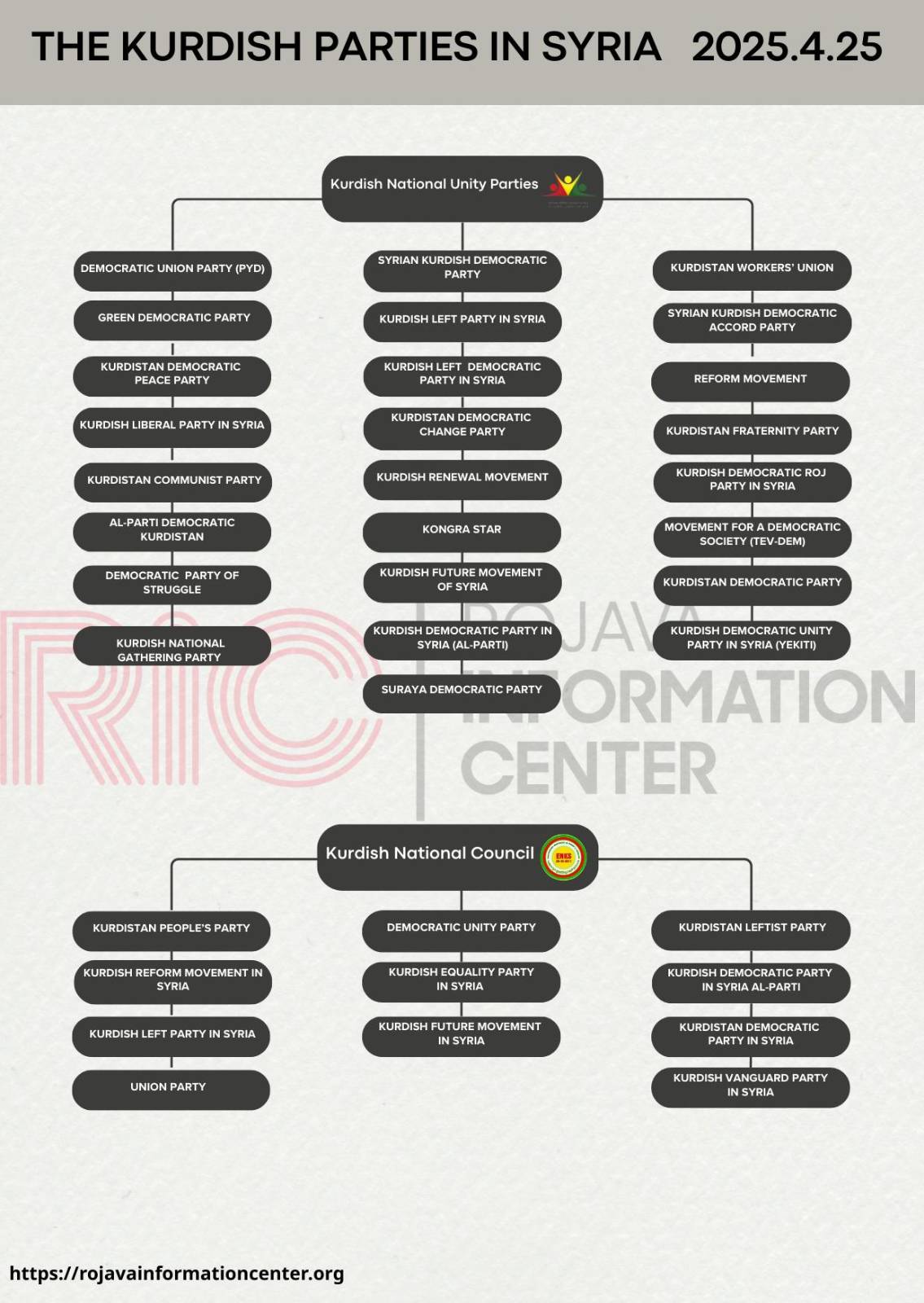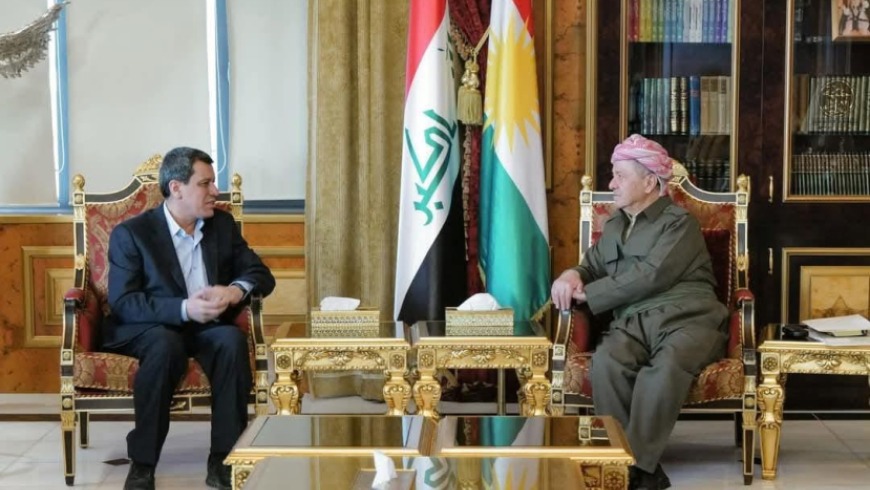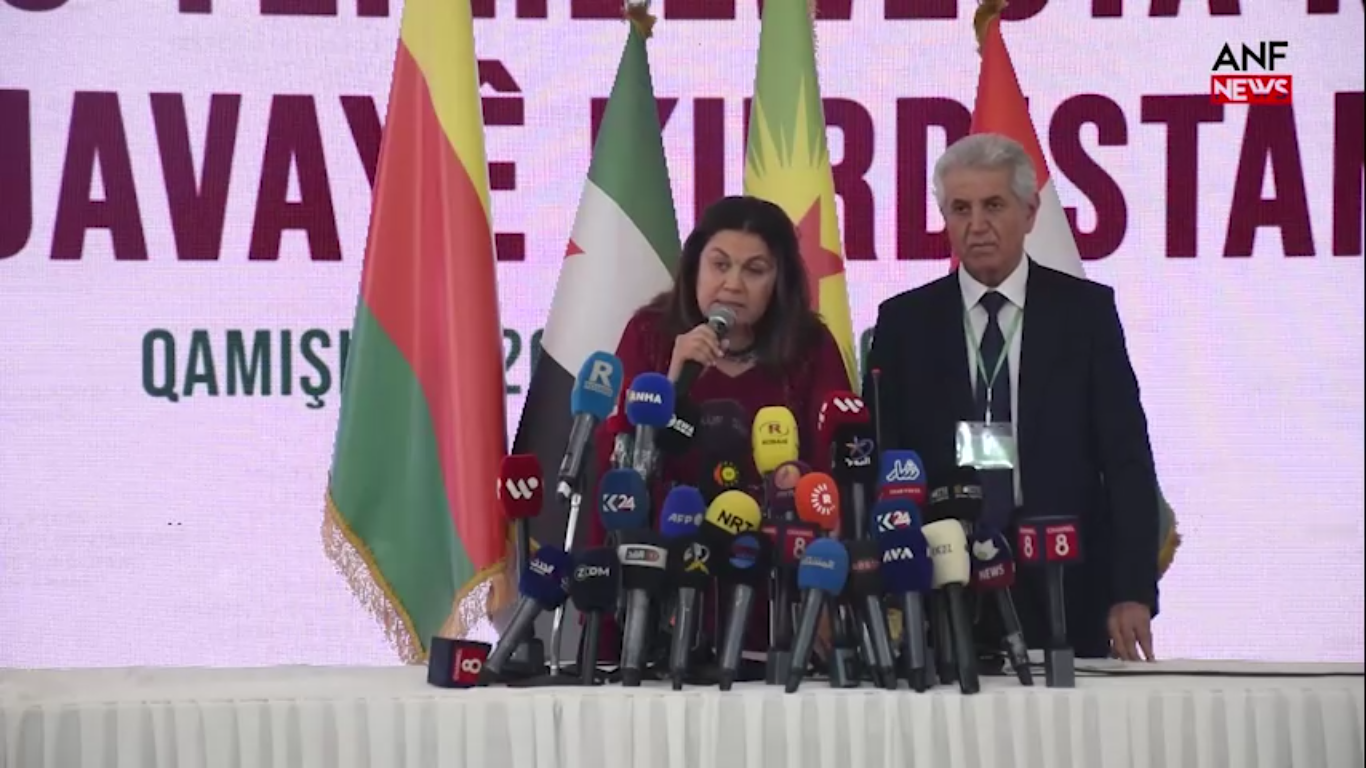The 26th of April, was set as the official date for the convening of the “Kurdish National Conference” in North and East Syria. This comes after a postponement due to the current war situation in the region and disagreements among parties regarding the conference. The aim of the conference is to establish a unified political reference for the Kurds in Syria, contribute to a just solution for the Kurdish issue within the future of Syria, and guarantee the rights of the Kurdish people through a document agreed upon by the participants. This marks the first time that Syrian Kurdish parties will convene on a common position regarding the Kurdish issue in Syria in over a decade. The initiative also enjoys support from the United States and France. This effort is backed by prominent Kurdish leaders, most notably Masoud Barzani, the former President of the Kurdistan Region of Iraq, who hosted the Commander-in-Chief of the Syrian Democratic Forces (SDF), Mazloum Abdi, this past January in Erbil. According to the preparatory committee, more than 400 figures from Rojava, North and South Kurdistan, as well as Kurdish personalities from various Syrian regions such as Damascus, Aleppo, Hama, al-Bab, and Azaz, will participate in the conference. A delegation from the Peoples’ Equality and Democracy Party from Northern Kurdistan and representatives of parties and organizations from Southern Kurdistan will also attend.

For further details about the conference, the Rojava Information Center conducted interviews with Sema Bekdash, the spokesperson for the Kurdish National Unity Parties (PYNK), and Dr. Gharbi Mahmoud Ahmed, a member of the preparatory committee for the Kurdish Dialogue Conference.
Bekdash stated that the steps taken to hold the conference follow a period of work and preparation, aimed at accomplishing it with the participation of all political parties. There were parties that showed reluctance or unwillingness to participate, such as the Kurdish National Council (ENKS), but after several attempts, they ultimately agreed to join and participate in the conference. She added: “Each party has its own political and ideological orientation regarding strategic and political issues, which is why the collective approval of the prepared document by all parties represents a highly important step toward unifying the Kurdish position. The conference will discuss the political document as well as the nature of the desired system in Syria and how to address the Kurdish issue within the country. If the Kurds can express their vision with one voice and a unified position, this will certainly have a strong and effective impact.” Regarding the document, Bekdash noted that it includes participation from the Kurdish National Council, the Kurdish National Unity Parties, and the preparatory committee. The document contains key points concerning the rights of the Kurdish people, language and culture, identity and existence, ensuring a unified Kurdish voice in any future political dialogue, especially in the event of negotiations with Damascus. This consensus is expected to have a tangible impact on the overall political process.

Sema Bekdash, spokesperson for the Kurdish National Unity Parties (PYNK)
Dr. Gharbi Mahmoud Ahmed, a member of the preparatory committee, emphasized that the goal of the conference is to achieve national unity in Rojava and all parts of Kurdistan, “given the sensitive and critical phase the Kurdish people are experiencing.” He stressed that Kurds in all four parts of Kurdistan are looking toward this conference. He explained that the conference is not solely focused on political parties but also seeks to involve various social components—women, youth, intellectuals, writers, and independent figures—so that national unity can be inclusive and genuine.
Currently, “there are no major disagreements between the parties,” but the main challenge lies in drafting the political document by ENKS, PYNK, and other parties in addition to the preparatory committee. The conference will discuss the prepared document, which outlines a clear vision for the desired system in Syria. Final outcomes will be issued based on discussions among the participants, including how to address the Kurdish issue within this framework. The document includes several main points, most notably the rights of the Kurdish people, Kurdish language and culture, and matters related to Kurdish identity and presence in Syria.
The primary goal of this document is to unify the Kurdish position and present clear and collective demands in the name of the Kurds, granting them a unified voice in any upcoming political dialogue, especially in anticipated discussions with the Damascus government. This is expected to significantly impact the trajectory of the political solution. Regional and international pressures on both sides have increased following the fall of the Assad regime last December. The file saw a breakthrough after the visit of SDF Commander-in-Chief Mazloum Abdi to the Kurdistan Region of Iraq and his meeting with former President Masoud Barzani, where they reaffirmed their agreement on the necessity of Kurdish unity. A few days ago, the ENKS presidency announced the agreement on the date of the Kurdish Unity and Position Conference. It was officially declared by Abdi on the platform X, to be held officially on Saturday, April 26. The council considered this step a political entitlement reflecting the aspirations of the Syrian Kurds, affirming that the achievement was a result of the will of the Kurdish people and the efforts of its fighters, with support from former President Barzani and Commander Abdi. Abdi also met with the Kurdistan Region President Nechirvan Barzani on April 24, where both sides emphasized the importance of enhancing unity and understanding among Kurdish forces and parties in Syria, considering it a fundamental guarantee for achieving the legitimate rights and demands of the Kurdish people in the country. Invitations to attend the conference were extended to all Kurdish political forces, including Kurds from Damascus and Aleppo, those living abroad, and other parties outside both ENKS and PYNK frameworks. It is a national conference and does not belong to any specific party or entity.

SDF Commander-in-Chief Mazloum Abdi meets with Kurdistan Democratic Party leader Masoud Barzani
Gharbi also spoke about a meeting held in January in “Azadi Park,” attended by delegates from various Kurdish political forces excluding the Kurdish National Council. He stated: “The success of the conference hinges on the absence of Turkish interference, which has always sought to thwart efforts to unify the Kurdish front. Nevertheless, there is general optimism following the meeting between Mazloum Abdi and Masoud Barzani in Erbil.” He stressed the importance of everyone’s participation in this event, as Kurds without comprehensive unity will face many difficulties. He also mentioned logistical challenges, such as the difficulty of some participants traveling from distant areas, in addition to the potential interference of hostile parties. However, he expressed hope that the results of the conference would be positive with everyone’s participation. Bekdash stated:
“We are approaching this with a sense of responsibility, and if we make concessions, they will not be losses, but sacrifices for the sake of building national unity. It is certain that there are many forces that do not want Kurdish unity and have played a role in obstructing it. […] The conference will only discuss the document and will have outcomes based on the discussions held by the participants. We are approaching this path with a spirit of responsibility, and we believe that any concession made in the interest of building national unity is not a loss but a sacrifice in the right direction. It is clear that many powers do not wish to see Kurdish unity realized and have played a role in hindering this path in the past. Therefore, the commitment of parties to their historical responsibilities requires them to transcend personal and partisan interests and put the public interest, the protection of gains, and the resolution of the Kurdish issue in Syria at the forefront of their priorities.”
This view was also shared by Gharbi, who also added: “Certainly, change will address the general political situation and the overall state of the Kurdish movement, the requirements the Kurdish movement needs, the general state of Turkish-Syrian relations, as well as the challenges facing the Kurdish movement such as continuous Turkish bombardment and Kurdish-American and Kurdish-international relations.”
Finally, Gharbi emphasizes: “Syria will not be stable without a radical solution to the Kurdish issue, which has been marginalized for decades. Today, the Kurds have a military force respected worldwide, and Kurdish delegations are received in major capitals such as Washington, Moscow, and Paris, especially after their significant role in fighting ISIS. Therefore, holding this conference is a pivotal step not only in unifying the Kurdish position, but also in changing the general perception of the Kurds in Syria, and perhaps establishing a new phase of dialogue and national reconciliation. […] After the Rojava Revolution, the Kurds have become the leaders of a democratic project in Northern and Eastern Syria, alongside other ethnic groups, and have been able to build a comprehensive democratic project in the region, in order to preserve these gains.”

